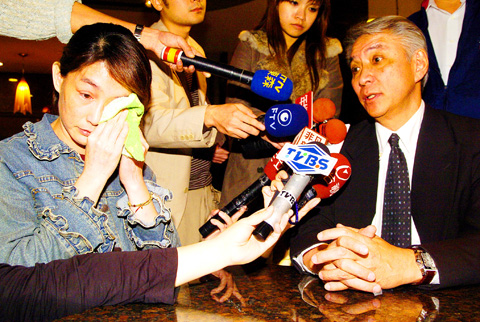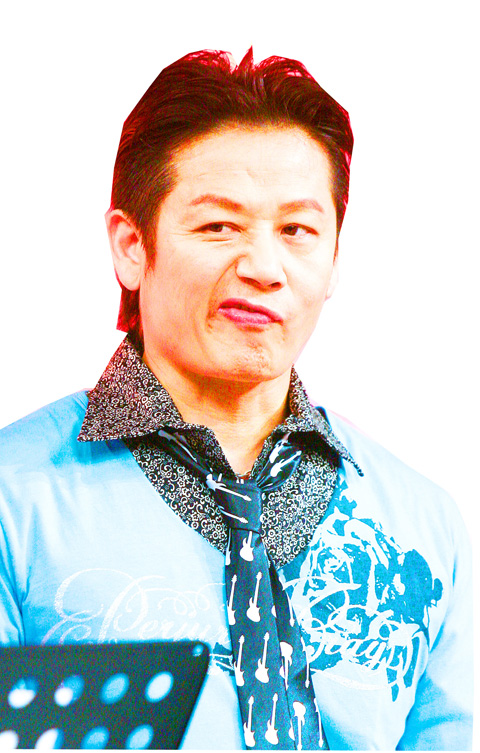This week’s gossip rags have been dominated by domestic quarrels between retired stars with names that seem to come from another era. A suspected extramarital affair, alcoholism, domestic violence and other unspeakable skeletons in the family wardrobes are playing out in the public sphere like a juicy soup opera plot.
First to kick off the melodrama was actor-turned-hypnotherapist Hsu Ming (徐明) and Ying Tsai-ling (應采靈), who tied the knot with Hsu at the height of her acting career 26 years ago. China Time Weekly (時報週刊) reported that Ying last week moved out of the marital home with four pet dogs after Hsu accused her of having an affair with the couple’s next-door neighbor and, while under the influence, beat up the alleged paramour.
Bouts of grouching and bickering ensued, which were widely interpreted by the media as reenactments of the couple’s past roles in cheesy television drama series some 20 years ago.

PHOTO: TAIPEI TIMES
Though the pair reconciled with a big hug in front of the press on Tuesday, a possible lawsuit awaits China Time Weekly as Hsu remains inflamed by the magazine’s accusation of infidelity.
Meanwhile, a different husband-and-wife tiff appears to have taken a tragic turn in the story of the divorced couple Chang Chen-huan (張振寰) and Pao Cheng-fang (鮑正芳).
Once a sought-after TV actor, Chang now lives on loans from friends, works odd jobs and is consumed by alcoholism and depression, or so it seemed as he recounted his miserable life to invited media in front of the food stand he works at.

PHOTO: TAIPEI TIMES
Chang was portrayed as a pitiful man denied the chance of visiting his son by his ex-wife. A different side of the story the following day, however, when a tearful Pao suggested Chang had abused her and threatened her with a knife.
In litigation-related news, veteran entertainer Chen Chin-pei (陳今�?as found guilty for publicly insulting retired singer Hsieh Lei (謝雷) by calling him an “old gay” while appearing on a TV variety show about three years ago.
Chen was fined NT$9,000 after failing to convince the judge that the word gay is a neural term for unmarried men. Pop Stop fails to see how being called old and gay could be used as a “serious” insult.
Also on the legal front, political show host Cheng Hung-yi (鄭弘儀) filed both civil and criminal suits against pan-blue-camp entertainer Hsu Nai-lin (徐乃麟) for calling him a black-hearted, or hei xin, (黑心), in public. Hei xin goods refers to Chinese merchandise that is hazardous to public health. Hardly an imaginative putdown.
The squabble began when pan-green-camp host Cheng reportedly expressed his eagerness to host president-elect Ma Ying-jeou’s (馬英九) inaugural ceremony on May 20, free of charge. Hsu later backed down by saying he had borrowed the term “hei xin goods” from entrepreneur Robert Tsao (曹興誠) to refer to political talking heads in general.

The unexpected collapse of the recall campaigns is being viewed through many lenses, most of them skewed and self-absorbed. The international media unsurprisingly focuses on what they perceive as the message that Taiwanese voters were sending in the failure of the mass recall, especially to China, the US and to friendly Western nations. This made some sense prior to early last month. One of the main arguments used by recall campaigners for recalling Chinese Nationalist Party (KMT) lawmakers was that they were too pro-China, and by extension not to be trusted with defending the nation. Also by extension, that argument could be

Aug. 4 to Aug. 10 When Coca-Cola finally pushed its way into Taiwan’s market in 1968, it allegedly vowed to wipe out its major domestic rival Hey Song within five years. But Hey Song, which began as a manual operation in a family cow shed in 1925, had proven its resilience, surviving numerous setbacks — including the loss of autonomy and nearly all its assets due to the Japanese colonial government’s wartime economic policy. By the 1960s, Hey Song had risen to the top of Taiwan’s beverage industry. This success was driven not only by president Chang Wen-chi’s

Last week, on the heels of the recall election that turned out so badly for Taiwan, came the news that US President Donald Trump had blocked the transit of President William Lai (賴清德) through the US on his way to Latin America. A few days later the international media reported that in June a scheduled visit by Minister of National Defense Wellington Koo (顧立雄) for high level meetings was canceled by the US after China’s President Xi Jinping (習近平) asked Trump to curb US engagement with Taiwan during a June phone call. The cancellation of Lai’s transit was a gaudy

The centuries-old fiery Chinese spirit baijiu (白酒), long associated with business dinners, is being reshaped to appeal to younger generations as its makers adapt to changing times. Mostly distilled from sorghum, the clear but pungent liquor contains as much as 60 percent alcohol. It’s the usual choice for toasts of gan bei (乾杯), the Chinese expression for bottoms up, and raucous drinking games. “If you like to drink spirits and you’ve never had baijiu, it’s kind of like eating noodles but you’ve never had spaghetti,” said Jim Boyce, a Canadian writer and wine expert who founded World Baijiu Day a decade